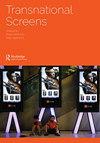World Cinema between the rock of the unknowable and the hard place of the as yet unknown
IF 0.4
0 FILM, RADIO, TELEVISION
引用次数: 3
Abstract
ABSTRACT Hypotheses that instigated the possibility of destabilising and de-westernising film theory have inspired a critical framework for analysing World Cinema that demands new and evolving understandings of its construction and fluidity, particularly in relation to its lost pasts and possible futures. Referencing several key works in this field and responding to David Martin-Jones’s Cinema Against Doublethink: Ethical Encounters with the Lost Pasts of World History (2019) in particular, this article questions what is unknowable and as yet unknown about World Cinema. Following Derrida, it argues that the answers lie in how World Cinema gains meaning(s) through the process of différance (difference and deferral of meaning), particularly through genre. Deploying and dismantling genre theory in case studies of Wind River (Sheridan 2017), Chung Hing sam la/Chungking Express (Wong 1994), Faa yeung nin wa/In The Mood for Love (Wong 2000), Moonlight (Jenkins 2016) and Widows (McQueen 2018), the article targets the logjam of ethical hesitancy in approaching World Cinema and, holding that impurities in western cinema constitute trace evidence of new paradigms happening elsewhere in World Cinema, posits empathy and its deferral as essential to an understanding of the dynamics of the cinemas of the world.激发电影理论不稳定和去西方化可能性的假设激发了分析世界电影的关键框架,这需要对其结构和流动性进行新的和不断发展的理解,特别是与其失去的过去和可能的未来有关。参考这一领域的几部重要作品,并回应大卫·马丁-琼斯的《反对双重思想的电影:与世界历史上失去的过去的伦理遭遇》(2019),本文质疑世界电影的不可知和未知之处。按照德里达的观点,它认为答案在于世界电影如何通过差异(差异和意义的延迟)的过程获得意义,特别是通过类型。在《风河》(Sheridan 2017)、《钟兴三蓝》/《重庆森林》(Wong 1994)、《花样年华》(Wong 2000)、《月光女孩》(Jenkins 2016)和《寡妇》(McQueen 2018)的案例研究中运用和拆解类型理论,本文针对接近世界电影时的伦理犹豫僵局,认为西方电影中的杂质构成了世界电影其他地方发生的新范式的痕迹证据。假定移情和它的延迟对于理解世界电影院的动态至关重要。
本文章由计算机程序翻译,如有差异,请以英文原文为准。
求助全文
约1分钟内获得全文
求助全文
来源期刊

Transnational Screens
Arts and Humanities-Visual Arts and Performing Arts
CiteScore
0.60
自引率
0.00%
发文量
23
 求助内容:
求助内容: 应助结果提醒方式:
应助结果提醒方式:


